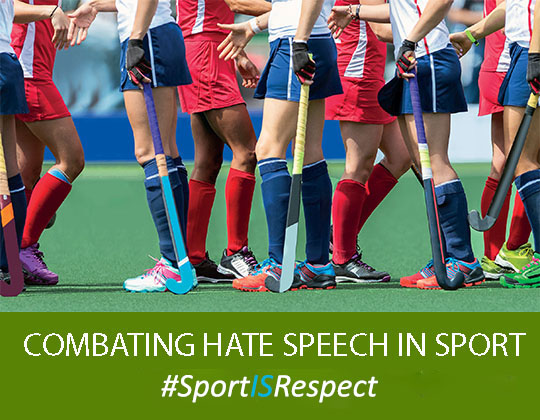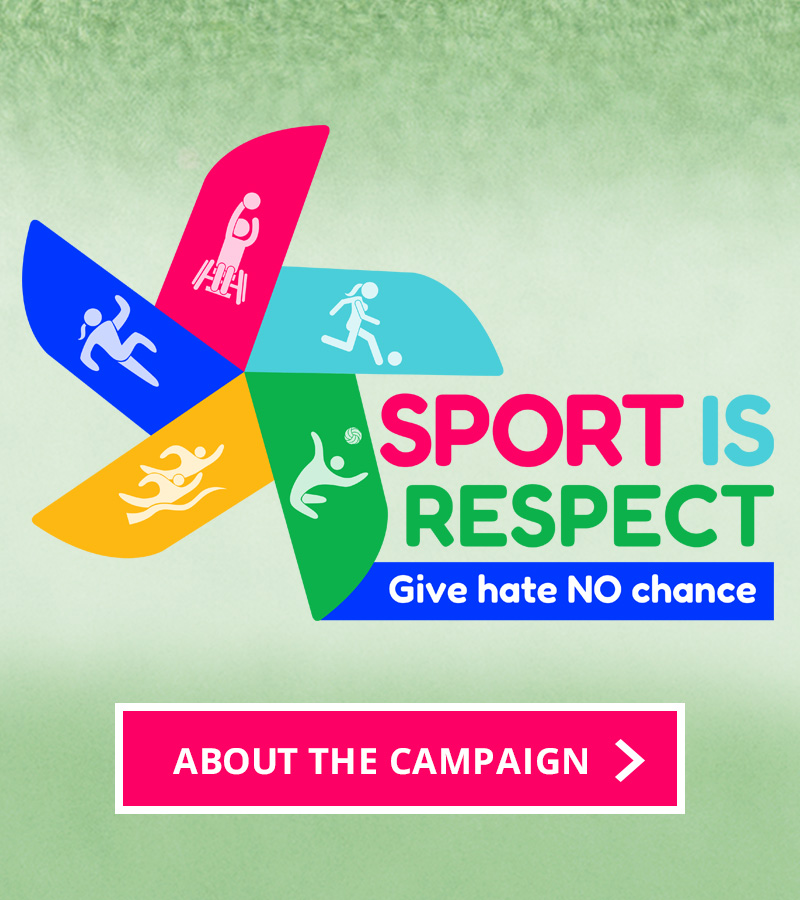About the project
The Combating Hate Speech in Sport project aims to explore innovative approaches to address hate speech in sport. It is co-funded by the European Union and the Council of Europe and implemented by the Council of Europe’s Sport Division until June 2024.
The project aims to combat hate speech in sport by providing technical assistance to public authorities in member states and other sport stakeholders to develop comprehensive strategies within a human rights framework.
The areas of action to address hate speech entail:
- Presenting the state of play of hate speech in sport, including the online dimension. After a stakeholder mapping exercise, public authorities, sport organisations and other key players will be involved in collecting data, identifying gaps and opportunities, sharing examples of good practice, assessing needs and proposing ways to collectively and individually prevent and respond to hate speech.
- Providing guidance leading to the adoption of national strategies in the partner countries to combat hate speech in sport involving all key stakeholders.
- Setting up an online resource centre providing relevant information on existing tools to combat hate speech in sport, and identifying measures to prevent, counter, report and remedy hate speech, notably through the No Hate Speech Movement campaign, the Council of Europe Gender Equality Strategy, the programme of the Enlarged Partial Agreement on Sport and other relevant instruments.
- Designing, implementing and evaluating a “no hate speech in sport” campaign, including training and tools to strengthen the stakeholders’ capacity to play their part in preventing and combating hate speech in sport.
 Background information
Background information
Sport brings people together. It contributes to health and well-being, breaking down barriers and building trust and community spirit. However, it can also exacerbate tensions or rivalries and foster discrimination against certain categories of the population, contrary to international standards, obligations and principles on fighting racism and discrimination.
Sport occupies a significant place in society and has a substantial impact on a large sector of the population: athletes, spectators, security forces or volunteers, among others. The strong popularity of sport means that sports organisations and clubs are required to ensure safe and empowering sport environments. For over four decades, the Council of Europe has promoted fair play and respect in sport, helping to make sport safer, more ethical and accessible to all. This vision of sport can be achieved by promoting human rights values in sport and preventing and countering discrimination and hate speech.
Despite an increased awareness about the seriousness of the problem, public authorities and sports organisations face major challenges when trying to address this phenomenon. The situation ranges from a complete absence of measures in some countries to fragmented responses in others. The effectiveness of the measures is hampered by gaps in the regulatory framework, the lack of clear prevention strategies including training and education, the absence of protocols for action and the failure to punish unacceptable behaviour. Key stakeholders (such as supporters’ organisations) are rarely involved in devising these measures and too often there is not enough cooperation between public authorities, the various competent bodies in this area and sports organisations.
Although both the European Union and the Council of Europe have developed a sound regulatory framework in this field, sports events are still far too often a forum for racism, homophobia, sexism and other manifestations of hate speech. On some occasions, such incidents also degenerate into physical violence involving supporters and result in the event itself being disrupted. The risk of incidents of this kind also forces some organisers to limit the access of supporters to sports events, or to deny access altogether. Every instance of hate speech is unacceptable behaviour which must be prevented and addressed. This project enables the various national initiatives to be scaled up through holistic national strategies involving all of the key stakeholders.
 Target audience
Target audience
- Public authorities responsible for law enforcement/justice, sport and education – by proiding and maintaining a general framework and making available a platform for dialogue and the exchange of information and know-how.
- Safety, security and serice staff, police, stadium safety officers, stewards, medical and ambulance staff and firefighters – by proiding expert input to the project and receiving training on identifying, preventing and countering hate speech.
- Sport organisations – by providing specific guidelines for stakeholders and receiving training on identifying, preventing and countering hate speech.
- Supporters, athletes, coaches and technical staff, referees and parents – by being inolved in strategy development and relevant information campaigns.
 Added value
Added value
The project has a strong operational dimension with a regional approach based on relevant national examples addressing hate speech in sport. It draws on the Council of Europe’s expertise in the fight against hate speech and in the development of sport policies and norms. Combating Hate Speech in Sport provides a European platform offering the possibility of tailoring the national approach to ensure safe and empowering sport environments. Sport stakeholders can choose their own tools and adapt their national No Hate Speech campaign, thus making this project extremely flexible and attractive to each country.



